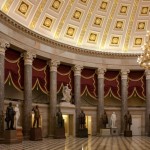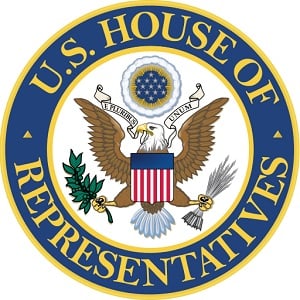A national movement of local governments is seeking to display plaques which read “In God We Trust” in the halls of government around the nation.
And in the city of Greenville, South Carolina, where my husband and I have enjoyed a brief holiday visit with our son, local lawmakers have unanimously voted to post a plaque with the phrase in the Council Chambers in Greenville’s County Square. County Councilman Fred Payne said, in an interview with the Greenville News,
“We’re just affirming that this is a great nation, and it was made great by a great God.”
In the twelve years that we’ve been traveling fairly regularly to this beautiful city on the Reedy River in South Carolina’s Upstate, I’ve learned to expect an openness toward faith that is uncommon in the northern states. Being in the Bible Belt means that it’s common to hear “God bless you” from strangers on the street.
In God We Trust America, the organization which is encouraging local officials to embrace the national motto, was founded more than a decade ago by Bakersfield, California councilwoman Jacquie Sullivan. The movement has caught on, and there are currently 373 local governments in 15 states which have voted to display the motto. Greenville approved the display on June 17, following approval by the neighboring city of Anderson on June 7.
Meanwhile, the American Civil Liberties Union, of course, does not want to see God acknowledged in a public place. Here in South Carolina, ACLU’s local director Victoria Middleton is doesn’t understand why the county would want to display a religious phrase in public buildings.
Middleton meets strong resistance, however, from Greenville County Attorney Mark Tollison.
Asked if he’d reviewed the legality of displaying the motto, Tollison cited a legal opinion from former South Carollina Attorney General Charlie Condon. Condon had concluded in his 2002 opinion that displaying the motto does not violate the First Amendment prohibition on laws “respecting an establishment of religion.” Condon’s opinion cited three federal appeals court rulings that upheld the use of the motto against Establishment Clause challenges.
* * * * *
Where did “In God We Trust” come from?
The phrase apparently originated in the fourth stanza of “The Star Spangled Banner,” which was written during the War of 1812, and began appearing on U.S. coins in 1864.
In a letter dated November 13, 1861, Rev. M. R. Watkinson petitioned the Treasury Department to add a statement recognizing “Almighty kGod in some form on our coins.” The motto was politicized even then: It was an effort, some believe, to show that God was on the side of the Union during the Civil War.
In 1956, it was made the National Motto, replacing the unofficial motto “E Pluribus Unum” which had been used since the Great Seal was adopted in 1782.
And by 1957, “In God We Trust” was prominently imprinted on paper money in the U.S.
Most Americans solidly support the posting of the national motto on public buildings. “It’s completely, solidly legal,” says Jacquie Sullivan.












